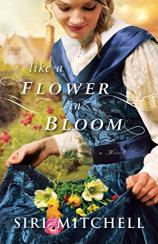Like a Flower in Bloom
Review
Like a Flower in Bloom
LIKE A FLOWER IN BLOOM introduces us to skilled botanist Charlotte Withersby. Charlotte is truly an expert who understands the minutiae of where and how a plant grows; how it is to be cultivated; and how to create a properly executed botanical illustration. She comes by this honestly; from her great-great-grandfather on down, her forebears were honored leaders in the field, having authored numerous publications and manuals. And that’s just on her mother’s side of the family! Her father is, as well, a learned and published botanist whose focus on plant classification has earned him a respected reputation. Botany is not only in her blood, but firmly in her heart and her mind.
Charlotte quietly and happily follows in her family’s footsteps. In her own mind, she only faces one, rather enormous obstacle: she is a female, living in 1852 England. She is not at all opposed to being a woman, as long as she can carry on with the beloved work and scholarship at which she’s so exceptional. But being female in her era automatically excludes her from professional recognition for her painstaking work. All her excellently done writing and research? Rejected. That is, when she submits it as Charlotte Withersby. When she resubmits it under her father’s name (unbeknownst to him), the botanical societies and publishing houses snap it right up, print it, and pay for it.
"Mitchell succeeds on all accounts; she is both an impeccable researcher and a gifted storyteller. You’ll be delighted with Charlotte’s story, and Mitchell’s storytelling ability will keep you enthralled to the very last page."
This is a good thing….albeit not entirely honest. Charlotte not only has essentially been serving as her father’s assistant and fellow scientist, but since her mother died, she has kept him going. She has ensured that the bills have been paid, his letters answered and work completed. She has kept a running correspondence, in her father’s name, with people all over the British Empire, who send him plant specimens for his research. In short, Charlotte has helped them survive. It’s just that no one knows that Mr. Withersby is not the person who’s been doing the work.
However, this partnership, though Charlotte doesn’t know it yet, is about to come to a screeching halt. Her beloved uncle, the esteemed Admiral, has decided it’s time for her to marry. He believes that she must enter society, meet an appropriate man, marry him, and put aside her botanical interests. And he has a plan to make it happen.
Charlotte only agrees to the scheme because she is quite certain that, once she’s not available to assist her father, he’ll realize he cannot do without her. To her shock and surprise, one of their correspondents, a sheep farmer from New Zealand, arrives on their doorstep, and Mr. Withersby immediately hires the irritating Edward Trimble as his new assistant. Charlotte is quite sure it won’t last, however. Her own secret plan is to show her father just how indispensible she is and to regain her position and work.
The Admiral launches Charlotte into society with mixed results, at least at the beginning. Charlotte, who’s quite gifted at identifying plants, has no idea how to behave in polite British society. She is open, truthful and direct, but completely unaware of the social niceties of conversation. And her clothing! She’s always dressed appropriately for countryside rambles, but the fashions of the upper-class gentry escape her completely.
Charlotte’s launch certainly would have been a disaster if the genteel and beautiful Miss Templeton had not immediately taken Charlotte under her wing. Miss Templeton befriends Charlotte, helps her purchase a wardrobe, and assists her at every turn. Charlotte even catches the eye of two men: the local rector and a wealthy local businessman. Mr. Trimble offers his direction; he surprisingly knows quite a bit about fashion and society. He begins to annoy her a little less and interest her a little more, even as she’s rather disappointed at his success with her father.
Charlotte has many ups and downs to come: misunderstood proposals, an accident with a horse, and a secret identity of someone she’s come to care for. She doesn’t think it could happen…but is it possible that she could find someone to love AND at the same time be free to pursue her beloved botany?
Over the centuries, societies have held certain, very defined expectations of women. We have such freedom today that it can be difficult to imagine the constrained lives of women in previous eras. Few authors accurately depict these challenges better than Siri Mitchell, who’s able not only to captivate us with her characters, but also to speak in their voices so accurately that you forget you’re reading a novel. Mitchell succeeds on all accounts; she is both an impeccable researcher and a gifted storyteller. You’ll be delighted with Charlotte’s story, and Mitchell’s storytelling ability will keep you enthralled to the very last page.
Reviewed by Melanie Reynolds on February 26, 2015
Like a Flower in Bloom
- Publication Date: January 6, 2015
- Genres: Christian, Christian Fiction, Fiction, Historical Fiction, Historical Romance, Romance
- Paperback: 368 pages
- Publisher: Bethany House Publishers
- ISBN-10: 0764210378
- ISBN-13: 9780764210372




